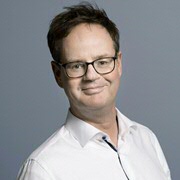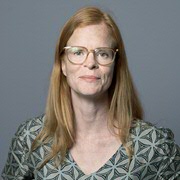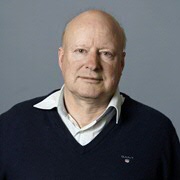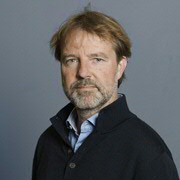Zernike Board
The Board (information on the portfolios below) of the Zernike Institute for Advanced Materials consists of
Prof.dr. Jan Anton Koster (chair) [Portfolio tbd]
(since December 2023)
Room: 5118.0357; Tel: +31 50 363 4928; e-mail: l.j.a.koster rug.nl

Jan Anton Koster obtained his PhD at the University of Groningen in 2007. After his PhD, Jan Anton Koster worked as a postdoc at the universities of Cambridge and Eindhoven. After having obtained a Veni grant for organic solar cell modelling, he moved back to Groningen to continue his work on organic semiconductors. In 2013 he was appointed as an assistant professor (tenure-track) at the university of Groningen. As of 2022 his is employed as full professor of novel semiconductors and devices. Currently, his main research interests include hybrid perovskite solar cells, organic solar cells and organic thermoelectrics. His research is supported by a Vidi grant from STW (2014) and a number of other national and European grants.
Prof.dr. Marleen Kamperman [Portfolio Education]
(since April 2022)
Room: 5118.03xx; Tel: +31 50 363 7888; e-mail: marleen.kamperman rug.nl

Marleen Kamperman studied Chemistry at the University of Groningen (UG) and was awarded her doctorate in 2008 at Cornell University in Ithaca, New York. Since 2018, she has been the Professor of Polymer Science at the UG. Here, Kamperman focuses on making new materials, such as the long, organic molecules that are often known as polymers.
Kamperman studies softer materials that are suitable for biomedical applications, among other things. Her focus now lies on adhesives that stick well to wet surfaces. Geckos, for example, appear to have a kind of superglue on their feet: they can peel their feet off surfaces and reattach them very often, without the glue losing its effect. Mussels also possess a unique type of glue that works under water. Marleen Kamperman is fascinated by this. She is attempting to replicate such special types of glue. These could be used in the human body, for instance, to adhere wounds shut instead of stitching them up.
Kamperman has received several honors, grants and academy memberships. In 2010 she receivend an NWO Veni, in 2012 an NWO Athena Premium, was member and chair of the Wageningen Young Academy (2013-2018), received and NWO Vidi in 2014, was member of the Young Academy (DJA) of the Royal Netherlands Academy of Arts and Scinces (KNAW), reived the KNCV Van Marumpenning (2018), and in 2019 the IUPAC - Periodic Table of Younger Chemists and an ERC Consolidator Grant.
Prof.dr.ir. Bart J. van Wees [Portfolio Funding]
(since April 2020)
Tel: +31 50 363 4933; e-mail: B.J.van.wees rug.nl

Bart van Wees was born in Nootdorp (1961), and studied Applied Physics at the TU Delft. He received his PhD “cum laude” with professor Hans Mooij in 1989. He moved to Groningen in 1991 as KNAW research fellow where he worked on mesoscopic semiconductor and superconductor systems. Since 2000 he has been a full professor and chair of the group Physics of Nanodevices. His research activities include spintronics and spin caloritronics in metals, graphene and other 2D materials, as well as magnon spin transport in insulating materials. He is one of the four Focus Area Leaders for the research of the Zernike Institute National Research Centre. Van Wees coordinates the activities on spintronics in the EU Graphene Flagship. He has received several prizes and distinctions, including the election as member of the KNAW in 2009 and fellow of the American Physical Society in 2014. He is one of the recipients of the 2016 SPINOZA Award.
Prof.dr.ir. Patrick R. Onck [Portfolio PR&Outreach]
(since April 2020)
Room: 5113.0114; Tel: +31 50 363 8039; e-mail: p.r.onck rug.nl

Patrick Onck holds a M.Sc. in Applied Mathematics from Delft University of Technology where he also obtained his PhD in Applied Mechanics (Cum Laude). In 1998 he started a postdoc at the Department of Engineering and Applied Sciences of Harvard University (USA) and in the same year he was elected Research Fellow of the Royal Netherlands Academy of Arts and Sciences (akademie-onderzoeker). In 2001 he moved to the University of Groningen where he became an Associate Professor in the Zernike Institute for Advanced Materials in 2006 and Full Professor in 2012. Research in the Onck group aims at understanding the mechanical and functional behavior of biophysical processes and smart materials. To do so, he develops multiscale computational techniques (e.g. molecular dynamics, finite element methods) to explicitly account for the (bio)physical mechanisms at the relevant length scales. Onck is Programme Director of the M.Sc. Physics and Applied Physics degree.
The Board's Strategic Portfolios in a nutshell
Education – Scope of programs – strategic developments – alignment of programs and outreach to schools with research
Coordinating the participation in the various education programs i.e. applied physics, physics, chemistry, chemical engineering, biomedical engineering, mechanical engineering, life science & technology; overviewing & stimulating the balanced assignment of TA’s from our PhDs
Funding – Signaling – Guidance – Feedback – Support
Improving the quality of proposals by best practices and internal peer-review, paving the ways of support, identifying opportunities in the complex funding landscape and outside the current scope
PR & Outreach – Editing – Social Media - Web – Print – ScienceLinX – Exhibitions
Editing and publishing news out of the institute in web/print, creating awareness at companies and (societal) partners, creating an image that is motivating students to engage in programs related to the Zernike Institute
Strategic partnerships – Inventory - Identification – Reach Out – Building Alliances (academic and industrial) – Networks (societal and academic)
Research alliances are key in the current funding landscape. Building them is timeconsuming. On the other hand many meet & greets are planned that fill agenda’s leading to nothing. Strategic approaches may help to act directed and make use of existing networks and expertise
The scientific director and office of the institute handle the portfolio:
Organization & Staff development – Values – Structure (clarity, roles) - Internal Communication | Hiring – Scouting – Talent Development
Creating clarity on roles, support and processes, reducing ad hoc actions and procrastination; support Finishing4; TD 3.0: preparing for funding and prizes; scouting for talent; running smooth recruiting procedures
© Photography by Reyer Boxem
| Last modified: | 15 January 2025 2.17 p.m. |
